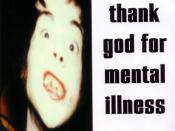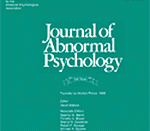Abnormal Psychology 1
Abnormal Psychology 2
Historical Perspective in Abnormal Psychology
PSY/410
Historical Perspective in Abnormal Psychology
Historically the perspective of abnormal behavior which may lead to "psycho" tendencies have always been taboo or "swept under the rug". To acknowledge that a loved one or self may have a psychological behavior issue was deemed a societal misnomer and the individual was locked away from others to be forgot and not pose as a reminder there are individuals in society with abnormal behavior.
The primary purpose of this paper is to explore and illuminate the distinctive history the discipline of abnormal psychology has made and present the significant impact in understanding mental illness, cognitive deficiency, and disorders.
Origins of Psychopathology
The early origins of psychopathology began with Hippocrates (460-377 B.C.), a great Greek philosopher and physician. His conceived theory was all diseases, not excluding mental illness, was derived from the disproportion of four fluids dispersed throughout the body (Hansell & Damour, 2008).
The era of the ancient Greeks and Romans their treatment of the mentally ill was humane for that time period. In modern day terms, one might think of a "spa" like atmosphere, such as massage, garden walks, and hydrotherapy to mention a few (Hansell & Damour, 2008).
The mentally ill were "cared" (the term is loosely used) for during the beginning of the 15 century, the Renaissance era was by placing them in institutions governed by the state.
According to the authors, Hansell & Damour (2008), "For example, in 1547, King Henry VII of England established an asylum called St. Mary of Bethlehem, from
which same the word 'bedham,' the local pronunciation of Bethlehem. This asylum Bethlehem became infamous as a tourist attraction where patients were exhibited to the public like creatures in a human zoo" (p. 27).
Fast forward to Dorthea Dix (1802-1887), for all intent and purpose just a "commoner" that wanted to change the inhuman treatment of the mentally ill. One could surmise she may have felt compelled to help those individuals that did not have the mental capacity to help themselves. Dorthea took it upon herself to raise money to see that treatment of the mentally ill be housed in asylums and institutions fit for humans to live in (Hansell & Damour, 2008).
Evolution of the Discipline
During the course of history, mankind has been enthralled with human behavior, especially behaviors society has deemed to be abnormal. Dating back to theological times the quest for clearness and the aspiration to remedy such behaviors has existed. There have been many theories regarding abnormal behavior varying for demonic possession to biological perspective has been well-thought-out. This extreme exploration led to the development of the abnormal psychology, which would later prosper into a scientific discipline (Hansell & Damour, 2008).
Analyzing Models
The following models or perspectives act as a reference to aid theorists in understanding abnormal behavior as well as the treatment. Some of these models will intersect each other. All models are important standing alone as well as together but each one has something importance to contribute to the school of psychopathology (Hansell & Damour, 2008).
Psychosocial model
The psychosocial models deal with an individual's personal interactions with their environment. Psychosocial reasoning behind abnormal behavior includes, but is not limited to, the study of stress triggers in deviant or self-destructive behavior (Hansell & Damour, 2008).
Biological-Medical model
Biological-medical perspective highlights the importance of the core physical causes of psychological disorders. Such disorders include two main groups:
those related to a medical condition, such as a disease or injury, and
those related to the use of a drug or medication.
In these disorders, the condition, drug, or medication is believed to cause mental problems by affecting the brain or other parts of the nervous system. These factors may also cause mental disturbances not yet identified. It is perceived many disorders result from genetic defects.
Sociocultural model
Sociocultural theorists view the development of abnormal psychology as an environmental or societal adaptation of one's behavior. It is the belief of; some sociocultural psychologists "emphasized the role of unemployment, poverty, discrimination, and the prison system in causing and maintaining criminal behavior" (Hansell & Damour, 2008) (p.63). Nevertheless other psychologists go so far as to claim that the idea of mental disorder is entirely fostered upon and devised by forces of societal obedience (Hansell & Damour, 2008).
Conclusion
There is a growing realization in the U. S. the issue of mental illness has come to monumental levels and the appropriate help is not there any longer. This is evident by the many homeless people conversing with themselves that are passed on the street on a daily basis. They are on the streets mainly due to the deinsstitutionalization of mental health facilities. Gone are the days of the "human zoos", but are they really? One may rationalize the zoo is now are streets.
Optimism is high that a change in treatment and housing is on the horizon.
References


